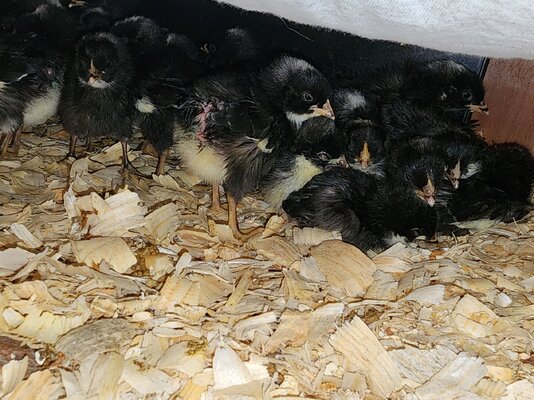DerSchoeneBahnhof
In the Brooder
So 2 years ago, we raised 3 chicks, 1 week old bought from shop, with 250 W heat lamp. They turned out fine. It was June, very warm weather such that we didn't need to use the heat lamp much.
Mid Feb '23 we bought 3 chicks, 2 of them died in a few days. Week later we bought 3 more, 2 of them died. The 2 remaining eat a lot so I think they are ok (though they bottoms are a bit dirty).
This year I decided to skip the heat lamp and switch to a heat plate instead (I picked a 12" x 12" 20 W model from Rent-a-Coop). The last chick that died had a lot of accumulated dried poop on the vent. We tried to clean it with a wet paper towel but there was just too much of it. It eventually refused to eat much and didn't make it.
Now the question is, what am I doing wrong?
- everybody seems to say heat plate is the way to go, and I am concerned about fire risk with a heat lamp
- I use corncob particles bedding though I recently switched to small pine shavings 'cuz it's what the shop had
- I gave them AG Farmers Best Feed starter
- I built a 24" x 48" x 12" wooden box currently in the living room, temperature is set to about 65 F
2 years ago I used a different starter (if I recall, Purina). So besides different weather I have 2 variables, the feed and the heating mechanism. Actually, a 3rd variable is we bought from a different shop, don't know if that matters too.
Any help appreciated! I can post a pic of the setup if this helps.
Thanks,
CG
Mid Feb '23 we bought 3 chicks, 2 of them died in a few days. Week later we bought 3 more, 2 of them died. The 2 remaining eat a lot so I think they are ok (though they bottoms are a bit dirty).
This year I decided to skip the heat lamp and switch to a heat plate instead (I picked a 12" x 12" 20 W model from Rent-a-Coop). The last chick that died had a lot of accumulated dried poop on the vent. We tried to clean it with a wet paper towel but there was just too much of it. It eventually refused to eat much and didn't make it.
Now the question is, what am I doing wrong?
- everybody seems to say heat plate is the way to go, and I am concerned about fire risk with a heat lamp
- I use corncob particles bedding though I recently switched to small pine shavings 'cuz it's what the shop had
- I gave them AG Farmers Best Feed starter
- I built a 24" x 48" x 12" wooden box currently in the living room, temperature is set to about 65 F
2 years ago I used a different starter (if I recall, Purina). So besides different weather I have 2 variables, the feed and the heating mechanism. Actually, a 3rd variable is we bought from a different shop, don't know if that matters too.
Any help appreciated! I can post a pic of the setup if this helps.
Thanks,
CG




 . Lesson learned. I suspect the shop might make a difference too. In any event, last week I picked up two very energetic turkens from another shop and they are doing very well so far. I now have one sex-link, one salmon faverolle, and 2 turkens - the four chicks have different ages (3, 2 and 1 week).
. Lesson learned. I suspect the shop might make a difference too. In any event, last week I picked up two very energetic turkens from another shop and they are doing very well so far. I now have one sex-link, one salmon faverolle, and 2 turkens - the four chicks have different ages (3, 2 and 1 week).